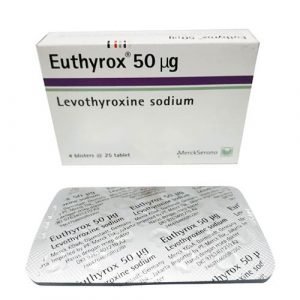Euthyrox Levothyroxine 50mcg.
What is Levothyroxine used for
Levothyroxine is a thyroid hormone medication that is used to replace deficiencies in thyroid hormone available in your body. It is used to treat the following indications:
• Hypothyroidism; a medical condition that causes your thyroid gland to produce a lower-than-normal amount of thyroid hormone. The thyroid hormone function is to regulate your metabolism. Symptoms of hypothyroidism include cold intolerance, muscle pain, hair loss, deep voice, tiredness, weight gain, dry and flaky skin, and a slow heart rate.
• Tumors that are responsive to TSH (type of thyroid gland tumor).
Do not take Levothyroxine:
• If you are allergic to Levothyroxine or any of the ingredients in this medicine. Tell your doctor about the allergy and what signs you have.
• If you have uncorrected adrenal insufficiency (underactivity of adrenal glands present in your kidneys).
Warnings and Precautions
• Talk to your doctor or pharmacist if you develop allergic reactions such as shortness of breath, skin rash, swelling of the face or neck, decreased blood pressure, and dizziness.
• Talk to your doctor if you experience any signs or symptoms of heart problems such as shortness of breath, fatigue upon exertion, chest pain, peripheral swelling, or fast or slow heart rate. Make sure to tell your doctor about any heart disease that you have.
• Your doctor may recommend periodic thyroid hormone tests to make sure that your levels are normal.
• Make sure to tell your doctor about any adrenal problems that you have before starting this medication.
• This medication may affect your blood glucose levels if you have diabetes (high blood glucose levels in the blood). Dose adjustment of your diabetes medications and careful regular monitoring of your blood glucose levels are required.
• This medication may affect your bone density negatively if you are taking a higher dose than needed.
Possible side effects of Levothyroxine:
Possible side effects of Levothyroxine include hyperthyroidism side effects if taken more than needed such as increased blood pressure or heart rate, shortness of breath, fatigue upon exertion, chest pain, peripheral swelling, palpitations, convulsions, fatigue, weight loss, loss of appetite, heat intolerance, fever, sweating, headache, anxiety, nervousness, muscle weakness, tremors, difficulty breathing, diarrhea, abdominal pain, vomiting, increase in liver enzymes, hair loss, and rash, decrease in body density, impaired fertility and menstrual irregularities.
Other medicines and Levothyroxine:
Tell your doctor or pharmacist if you are taking, have recently taken, or might take any other medications.
• If you are taking calcium or iron-containing supplements.
• If you are taking Orlistat (used for constipation).
• If you are taking bile acid sequestrants (used to treat high blood cholesterol levels).
• If you are taking ion exchange resins (used to treat abnormal electrolyte levels).
• If you are taking proton pump inhibitors, sucralfate, and antacids (used to treat excessive stomach acidity).
• If you are taking simethicone (used to treat bloating).
• If you are taking estrogen-containing oral contraceptives.
• If you are taking clofibrate (used to lower triglyceride and cholesterol levels in the blood).
• If you are taking anabolic steroids.
• If you are taking carbamazepine, phenobarbital, or phenytoin (used for seizures).
• If you are taking furosemide (diuretic).
• If you are taking rifampin (used to treat tuberculosis).
• If you are taking beta-blockers (used to treat high blood pressure and some heart problems).
• If you are taking amiodarone (used to treat heart irregular rhythm).
• If you are taking diabetes medications.
• If you are taking blood thinners.
• If you are taking digoxin (used to treat some heart problems).
• If you are taking antidepressants.
• If you are taking tyrosine kinase inhibitors (used to treat some types of cancer).

How to take Levothyroxine :
Adults:
The generally recommended initial dose is 1.6 mcg/kg/day. The dose is adjusted in increments of 12.5-25 mcg every 4-6 weeks until normal thyroid hormone levels are reached. Period monitoring every 6-12 months will be required afterward. The initial dose is not fixed and may change depending on the indication and its severity. Pregnant women may also require higher doses depending on thyroid hormone levels.
Children:
Dosing is weight-based. Take your dose as prescribed by your doctor. Close monitoring of thyroid hormone levels is required every 2-4 weeks until normal levels are reached and every 3-12 months thereafter until growth is completed.
• Take the tablet as one daily dose
• Take on an empty stomach, one-half to one hour before breakfast.
• Take the tablet at least 4 hours before or after calcium or iron-containing supplements and antacids.
• Take a tablet with a full glass of water.
• Take at the same time every day.
How to store Levothyroxine:
• Store at 15 to 30°C
• Keep out of the reach of children and pets
• Do not use beyond the expiry date mentioned on the box
• Keep the medication in its original pack to protect it from moisture
• Do not use damaged pills
• Do not dispose of pills in the wastewater or household waste
Get to know this link Levothyroxine Sodium (Levothyroxine Sodium Anhydrous Injection, Powder, Lyophilized, for Solution): Side Effects, Uses, Dosage, Interactions, Warnings (rxlist.com)
Related Link Hypothyroidism – Thyroid-Shop
Related products
Sale!












